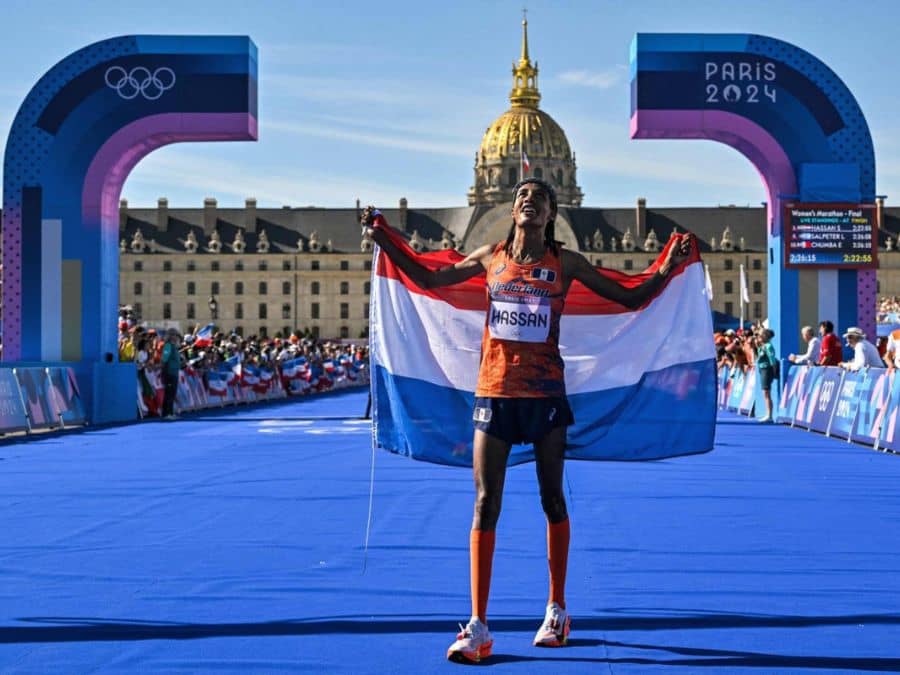“Maybe it’s going to turn out beautiful,” Sifan Hassan on the prospect of her running the Olympic 5000, 10,000 and marathon at Paris 2024.
It took until the very last event on the program for the athlete of Paris 2024 to emerge. And it took until the very last metres of the 42 thousand, 195 metres (plus a metre per kilometre to ensure there is no under-distance measurement) before it became clear Sifan Hassan was going to win the women’s marathon.
Having done that, adding marathon gold to 5000 and 10,000 metres bronze, Sifan Hassan ascended the Pantheon of Paris, indeed all-time modern Olympic history. Three medals in the three longest running events on the athletics program, two on the track, one on the road, a load contemplated by few other athletes.
Emil Zatopek did it in Helsinki in 1952. Uniquely, still, he won all three. Lasse Viren won the 5000 and 10,000 in Montreal in 1976, then finished fifth in the marathon. Hassan did it here, brilliant timing on a final day which showcased the women’s marathon.
It seemed she must be mad. Especially when Hassan’s opening bid for greatness was to enter four events, adding the 1500. When decision time came, she ditched the short event. Hardly an exercise in moderation.
Contemplating the task ahead of her in the days before the Games opened, Hassan declaired: “Maybe it’s going to turn out beautiful.”
It did. It DID turn out beautiful, Sifan. Thank you for letting us share.
Some shone brilliantly, but in one event. Noah Lyles garnered only one of his targeted two individual sprints and two relay gold medal. Mondo Duplantis has only one event, though he comes into the discussion of athlete of Paris 2024. Ditto Sydney McLaughlin-Levrone (discounting relays). Both set world records but one was not the number.
Faith Kipyegon, like Lyles, went for two individual gold and fell one short. Beatrice Chebet won the 5000 and 10,000, but Hassan earned minor medals behind her and then won the marathon.
And should relays even count in these discussions. Your correspondent has always argued that Zatopek should be honored alongside Carl Lewis and Jesse Owens as a multiple medallist because he won the same number of individual events as they did and didn’t have the option of a relay.
What about Fanny Blankers-Koen then. The Dutch athlete won the 100, 200 and 80 metres hurdles in London in 1948 which, relay excepted, was the whole individual program for women.

All these matters are subjects for enjoyable discourse and individual opinion. The sport has got more and more international over time. The world Emil Zatopek conquered was smaller than the one Viren competed against (even allowing for the African boycott of the Montreal Games) and the world in which Hassan competes is wider and deeper still. Crucially, none of the three events she did here were open to female competitors in 1952 or 1976.
By her own lofty standards, Hassan had a fairly moderate year leading into Paris. Good but ordinary good. Now it seems clear it was all leading to simulating the load she had chosen to carry.
All the time, Hassan was building to something special. Day by day in Paris the project was unveiled. Heat and final of the 5000 leading to a bronze medal behind Chebet and Kipyegon. A few days off then the 10,000, a knock down drag them off affair ending with a mass finish. Another bronze, Chebet and Nadia Battocletti taking the gold and silver. As the distances grew longer, the breaks were shorter – just one clear day between Friday night’s 10,000 and Sunday’s marathon.
This was the big one, as well as the long one. Hassan faced a field which included the defending champion, Peres Jepchirchir, the world champion Amane Beriso Shankule, a familiar long-time rival Hellen Obiri and New York winner in 2022 , second in 2023, and also second to Obiri earlier this year. Good credentials for a hilly Paris course.
As is her wont, Hassan was barely visible for most of the race. The lead pack had to thin out before you were even sure she was there. The first winnowing was done by Jess Stenson who ran strongly into the lead up the first significant climb. Then the killer climb which saw Stenson and Genevieve Gregson drop back but remain in the top 20.
When the climbing (mostly ended) we were briefly down to five. Obiri and Hassan had not stayed with the leading group, but like Tour de France cyclists they quickly ‘got across’ to the leading group, Hassan with a burst of speed which presaged what was to come. Obiri regained the lead pack a little more gradually. Quickly it became six – Hassan, Obiri, Assefa, Beriso, Lokedi and Japan’s Yuka Suzuki.
With 5k to run Suzuki was dropped. She kept on fighting, finishing sixth in 2:24:02. Obiri was the one doing most of the driving now and Beriso was dispatched just beyond 40k, leaving her go finish fifth in 2:23:57. Lokedi was off in the last kilometre, fourth in 2:23:14.
Obiri had to let go as the final sprint was launched, but she had her hands on the bronze medal and kept it in her grasp. Third in 2:23:10. Finally Hassan played her hand, pushing through between Assefa and the metal barriers with not much more than 200 metres to run. Poor Assefa, she came from an 800 background (a sub-2 minute runner) and at the end of the Olympic marathon came up against a rival with similar middle-distance speed.
There was brief contact between the pair, but nothing significant. Hassan sprinted home a winner in an Olympic record 2:22:55. It was the second Olympic record in two days on a course constantly described as “brutal”. Not as brutal as championship marathon racing perhaps.
Assefa took the silver in 2:22:58, to be fair to the course and the conditions, 11 minutes slower than her world record.
Trengove burnished her championship record, finishing thirteenth in 2:26:45 (she led at half-way in 1:13:22), Gregson followed soon after in 24th place in 2:29:56. Sinead Diver withdrew injured early in the race.
For Sifan Hassan, it turned out beautiful, very beautiful indeed.





